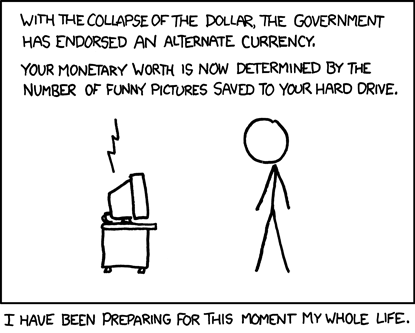The Mandibles: A Family, 2029-2047 by Lionel Shriver

(New York: HarperCollins, 2016), 432
- "The old man was liberal by creed, but she'd never met anyone with money who didn't have conservative instincts. One such instinct was to make the morally obvious (if fiscally inconvenient) seem terribly complicated." (11)
- "As your father, I shouldn't be letting you in on this rather ugly fact of life, but people who follow the rules are almost always punished." (82)
- "The surprise of sudden penury wasn't only the scale of the change, but its character. In retrospect, wealth had contorted Douglas Mandible's very nature." (133)
- "I feel as if we've failed them [the kids]. But not the way you think. I mean they've never been told no. And now we expect them to learn about adversity, self-denial, and disappointment overnight." (144)
- "Real poverty is about doing what you have to do as opposed to what you want." (161)
- "She dreaded Kurt's eviction. When she first took in a tenant, she hadn't considered that, for landlords with a conscience, renting was closer to foster care than commerce. She couldn't bear kicking someone out who had no place to go." (163-164)
- "Real generosity entails no recompense. It means giving up something you fiercely value and cannot replace." (169)
- "The dollar is a historied currency that's stabilized the international economy for over a century, Wilbur. The bancor is an upstart pretender whose constraints are unworkably strict. We just have to hold our nerve. After all—look at what happened to Bitcoin." (197)
- "The most useful skill he'd mastered in childhood was keeping his mouth shut." (255)
- "The long view was a defining feature of prosperity. The destitute planned a single step ahead." (284)
- "It was when you neither believed in systems, nor employed the tools of systems, that systems broke down for good. Look at what had driven inflation, far more than monetary policy: the self-fulfilling social assumption that that dollar was worthless and would be only ore worthless tomorrow." (285)
- "Maybe one merit of being in a country at all was its boundaries. They drew a line around what was your business." (332)
- "Across the nation, Americans' mental and physical health had vastly improved...No one had the money, time, or patience for pathology of any sort." (333-334)
- "Hoarding remained a synonym beloved of bureaucrats for retaining your own assets." (338) ^776a05
- "What do you make of the proposition that the definition of a truly free society is a place where you can still get away with something?" (339)
- "Young people want money to buy things...Old people want money for one reason and one reason only: to feel safe." (343)
- "Policing by propaganda is a money saver." (379)
"Right answer," Nollie said, lifting her feet from the box. She peeled off the tired packing tape, folded back the flaps, and removed the top stacks of banded printouts to the floor. She fingered up a pool of can-died kumquat drool from the laminated tabletop and moved the Bountiful House goblet out of the way. Struggling even using both hands, from the middle of the carton she withdrew a boxed manuscript titled Better Late Than. When she plunked it on the table, the tequila glasses rattled. She slipped off the top of the mimeo-paper box and removed about fifty pages. "There," she said. "Capital."
The box was filled with gold bars.
The Mandibles by Lionel Shriver, 396
^737790
- "In his embarrassment, all he came to understand was the one reliably sound thing to do with money: spend it on someone else." (398)
Source: Aftermath
Created: 2022-02-05-Sat
Updated: 2023-01-07-Sat
